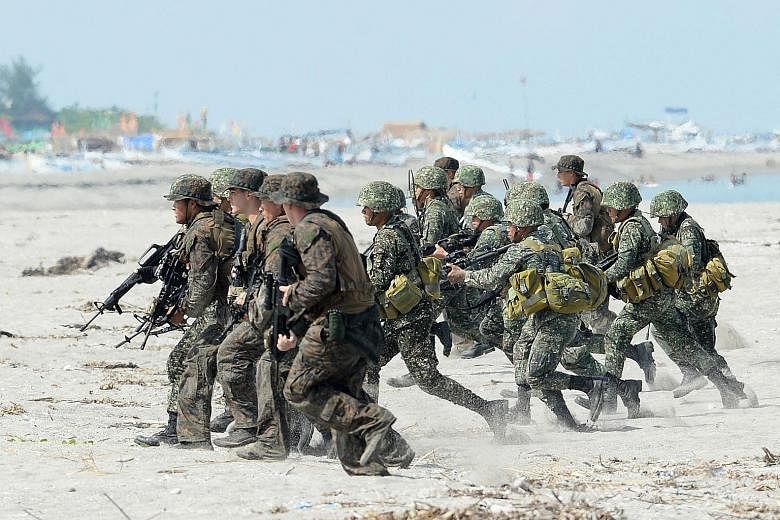WASHINGTON/SYDNEY • US President Donald Trump has said he does not mind the decision by the Philippines' President Rodrigo Duterte to end a decades-old military agreement with the United States, a position at odds with that of his defence secretary and the top US commander in the Asia-Pacific.
Mr Duterte announced on Tuesday the termination of the two-decade-old Visiting Forces Agreement (VFA), which sets out rules for US soldiers in the Philippines.
US Defence Secretary Mark Esper called the decision "unfortunate" as Washington and its allies press China to abide by "international rules" in Asia. The US embassy in Manila called it "a serious step with significant implications".
The decision, sparked by the revocation of a US visa held by a former police chief who led Mr Duterte's bloody war on drugs, takes legal effect in 180 days.
"I don't really mind if they would like to do that, it will save a lot of money," Mr Trump told reporters at the White House. "My views are different from others," he added.
Mr Trump has frequently expressed a desire to bring US military forces home from decades-long deployments abroad and has strong-armed some allies into paying more for the right to US defence.
He said the US had helped the Philippines defeat militants from the Islamic State in Iraq and Syria (ISIS) and he had "a very good" relationship with Mr Duterte.
Ending the VFA complicates US efforts to maintain an Asia-Pacific troop presence amid friction over the deployment of US personnel in Japan and South Korea, and security concerns over China and North Korea.
Referring to the period before Mr Duterte's decision takes effect, Pentagon chief Esper said on Tuesday: "We've got to work through it (180 days), and we'll just take a deep breath and take it one day at a time ... I don't get too excited about these things. We've got a process we have to work through."
Admiral Philip Davidson, Washington's top military officer in the Asia-Pacific, warned yesterday that the move would hurt counter-terrorism efforts in the Philippines' restive south.
Manila has given "180-day notice so we have some time for diplomatic efforts", he said at an event in Sydney. "I hope we can get to a successful outcome."
He insisted the move would hamper military operations in Mindanao - Mr Duterte's home island - where separatist and Islamist violence has killed some 100,000 people.
"Our ability to help the Philippines in their counter-violent extremist fight in the south, our ability to train and operate within the Philippines and with Philippine armed forces would be challenged without that visiting forces agreement," he warned.
Though a landmark peace deal with the largest of the rebel groups, the Moro Islamic Liberation Front, was sealed last year, the most brutal extremist factions - such as the ISIS-aligned BIFF and Abu Sayyaf, a kidnap-for-ransom gang behind some of the nation's deadliest attacks - were not included.
The rotating deployment of US troops - coupled with a longstanding mutual defence pact and regular military exercises - is also seen as a bulwark against rising Chinese influence in the region.
Some Philippine senators argued that Mr Duterte had no right to unilaterally scrap international pacts that the Senate had ratified.
Some lawmakers are concerned that two other pacts making up the longstanding alliance with the US would be irrelevant, namely, the 2014 Enhanced Defence Cooperation Agreement and a 1951 Mutual Defence Treaty.
Supporters of the agreements say they have helped deter Chinese militarisation in the South China Sea and the US$1.3 billion (S$1.8 billion) of US defence assistance since 1998 has been vital in boosting the capabilities of Philippine forces.
REUTERS, AGENCE FRANCE-PRESSE

